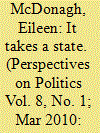| Srl | Item |
| 1 |
ID:
096280


|
|
|
|
|
| Publication |
2010.
|
| Summary/Abstract |
American women attain more professional success in medicine, business, and higher education than do most of their counterparts around the world. An enduring puzzle is, therefore, why the US lags so far behind other countries when it comes to women's political representation. In 2008, women held only 16.8 percent of seats in the House of Representatives, a proportion that ranks America lower than 83 other countries. This article addresses this conundrum. It establishes that equal rights alone are insufficient to ensure equal access to political office. Also necessary are public policies representing maternal traits that voters associate with women. Such policies have feedback effects that teach voters that the maternal traits attributed to women represent strengths not only in the private sphere of the home but also in the public sphere of the state. Most other democracies now have such policies in place, but the United States lacks such policies, which accounts for its laggard status with regard to the political representation of women.
|
|
|
|
|
|
|
|
|
|
|
|
|
|
|
|
| 2 |
ID:
142736


|
|
|
|
|
| Summary/Abstract |
Before the welfare state, people were protected from disabilities resulting from illness, old age, and other infirmities by care work provided within the family. When the state assumes responsibility for care-work tasks, in effect it assumes parental roles, thereby becoming a form of familial government in which the public provision of goods and services is analogous to care work provided in the family. My research pushes back the origins of the state’s obligation to care for people to a preindustrial form of government, hereditary monarchies—what Max Weber termed patrimonialism. It explicates how monarchs were cast as the parents of the people, thereby constituting kingship as a care work regime that assigned to political rulers parental responsibility for the welfare of the people. Using historical and quantitative analysis, I establish that retaining the legitimacy of monarchies as the first form of familial government in the course of Western European democratizing makes it more credible to the public and to political elites to accept the welfare state as the second form of familial government. That, in turn, promotes a more robust public sector supportive of social provision. The results reformulate conceptions of the contemporary welfare state and its developmental legacies.
|
|
|
|
|
|
|
|
|
|
|
|
|
|
|
|